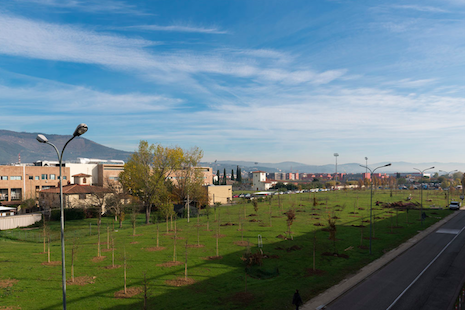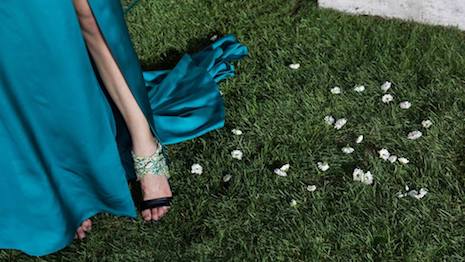Italian fashion label Salvatore Ferragamo is demonstrating its commitment to sustainability by planting an urban wood in Florence.
In honor of National Tree Day on Nov. 21, Ferragamo began the creation of Parco delle Idee, or Park of Ideas, inside the University of Florence’s Polo Scientifico of Sesto Fiorentino. While a physical example of Ferragamo’s desire to be greener, this initiative is also a means for the company to give back to its native Italy.
“This new commitment of the company and its employees, which for one day participated voluntarily in the plantation work, is for a further matter of pride for all of us,” said Ferruccio Ferragamo, president of the Ferragamo Group, in a statement. “Our company has always been committed to multiple initiatives aimed at the protection of the Italian historical, cultural and environmental heritage, and particularly of the Florentine and Tuscan ones, to which we are bound by long-standing affection and gratitude.
“The Parco delle Idee represents an effective, tangible way to express our appreciation for a reality to which we owe such a great part of our international success,” he said. “At the same time, it is the expression of a virtuous demeanor that every modern company has the duty to take in respect of the territory and social fabric in which it operates.”
A tree grows in Florence
This project will see the creation and maintenance of an urban forest, which will serve the multiple purposes, such as improving the air quality and boosting the local biodiversity.
Ferragamo’s new grove features about 200 native species of plants, such as Field Maples, Hackberries, Turkey Oaks, Holm Oaks, Pedunculate Oaks and Ash Trees.
The wood will provide a space for local schools to educate students in subjects such as biology and ecology, while also raising their awareness of the need for conservation.
For this initiative, Ferragamo teamed with LifeGate, a group that dedicates itself to sustainable communication, consultation and action.
“We are proud of this project, which underlines the importance and effectiveness of urban green, as well as its benefits on people's health and that of the environment,” said Enea Roveda, CEO of LifeGate. “It is an actual challenge to make cities more and more resilient.
“Our collaboration with Salvatore Ferragamo is a positive example of how a symbol of Made in Italy in the world is also able to have a positive influence on the local territory and community, taking care of its roots and reinforcing the fabric of both society and environment.”

Ferragamo's Parco delle Idee. Image credit: LifeGate
LifeGate also tapped the technical abilities of Carbonsink, a spin-off of the University of Florence focused on combatting climate change.
“The Parco delle Idee lays the foundations for the creation of green available areas in the Polo Scientifico of the University of Florence, and is part of the Tuscan Region project to realize the Bosco della Piana,” said Francesco Ferrini, tenured professor at the University of Florence and scientific coordinator of Carbonsink.
“It represents neither a payback, nor a recolonization from the nature of the spaces occupied by humans,” he said. “Rather, it is aimed at the research of a new form of complementarity between fruition and green component, meeting the needs of the first, without altering the balance of the latter.”
Carbonsink plans to use this project as a case study in reducing carbon dioxide emissions, calculating how different species of trees absorb the gas.
Ferragamo has taken great steps to become a sustainable company and reduce its negative effects on the environment.
Ferragamo released its Sustainability Report 2016, which showed a 10.8 percent decrease in its natural gas consumption in one year from 2015. Also, Ferragamo's Italy-based employees traveled more than 9,542 kilometers, or 5,929 miles, carpooling (see story).
{"ct":"zt7Cxjtba8\/eOtvrKn6KHlLoZLcgQqA0r1JVAujkLkRrCrfutFBb5+SOx\/f1pkxZQaZReklmzmsQqgeDk8E3CxD0kn291jDotQHiNLYjJitdPQfUeDczKsHfJGLFqQBeXRBX5bLwDlcEcwuU8tWnQFBvDr5bh4FyBZbVslUpwTiMaO5C9uGOH2Xf52wmccAhm0zVMn+mjkA5UbCtILwAFxQ2IAghJYX02u8fCIzgTOQ4ALqvSSWlKfWSqRwb2FedLHiC8Qh0S8Fgmr3FwlTzzhvGOxf0ckVSowBjmkq2VQZzXRWGLZ73hdnROSOnPpejEo4N+\/IXjJyLH2u4axcU7bGUwORSmcxReMouwxW2wGMLQVqedMHjzoIL3dJX4UzDeg950ZkxSqmxOQRYOaCc5Uhd8dVn8wZRZpADpf+lYsJVBN9rN21+bn\/H97tJfGxP13IChOA6wTVhxraEOJbUSsdljPiSTZbiRyjCF4BDnMPYb4t9PspZ7ptifnwnsZJmJQtsfSGVfm5Ov2m4oaDAb2I4hCcTyPLQkQCGyvumI2mtBelUwkfXwvpm21DgKBwFWmLG8WNW9DO3QCCK31UM66x6t8aqpGKRSoxv+WXnRuK8\/mbaIi1\/fktdsGCzPAKaKp5eZ1eGD+spJSrT\/zIdpzeF35s6Af7aziEuIZPQLXHPLe6hB5ENI+8\/Qp7qkk4BUQbRHtl2\/JmiTFYoTK7E\/xWEUnU9LzUp+vlQePCaU5j5wFsfmPbpi2lUHg9Kpv3gptGNTU1ETwRaebkBPH3i0aC0wQrfxqHkZgmJmWeuRPrJWGoosGy8NZlxlOX\/kZ6c1jtFYBroRxR2DMJcVqam+CJDDTwnSqsVeWFzTOpU27utmD+OBQOvOJ0RtI7n0tYeidcdj6l1QXq1TV+0+2KVVjQPHFz7Yn1iAnbhbWWcUWw9LZF3yzKEYCXoyAnbrPh99lUcay2c0IAHkX37T8jGlY7tp4QzK1rlhOtj\/HbrtLWQDVM0q\/muwhO3C7wK\/+5dxJncFChVGV0wP6cP61y7827F6eBmxrftTvbNoX25gQ3jtWlh2lGDwjJY2mVsAY1fiyP5vW4sA\/A3IFiRcjqlG2c9dLx5W7oBKaPXcD3HwpNLSGaI6E8g5MaUA9Y6zg0Avgop8FNiqcINJBCoGk7F1gRFQGKGsshfEqh\/CGISXVj0CoUnwfoqeO9EC3v1LLVuZRG7QZwL1i+ItPH0GbyqfOp\/Xp7KQPzltzIELyOYcstQ3nQBCF1zd5R9dyHKVRwO\/if3t6Sr5gtTTzL71ZNLX2DHq1ltaUtkXN9z07YrPnEFhzQe5t8jU0w32w8vd5ZkXuLkQr7PQKd1\/BTn3XbtVWLJlLKIkYKA2kOtlKJ43JzODNBnxou9BiI76fn+02wFwQ2buIxc+VPWNYUjXbryTpgo2KgUKw2pHzl4zucaaFoYchQLeM5ImrpHrrs3mI5hqqDPnS33Dfa+Ud37WUXtcDhtVPR6R1o1DF9O+4HnVCPWpZIZHNkN5snfTv7dPFb1hp0zk5lLzEakcODSg1gGZAafvtOScYUaaopU9+y\/69NZ0HkO3LOHZjoVwCwQ6fkNCRx8TuPMPsnLsEeHdFxNSNk+cFy\/xhMHOjnyD9WkTy3Vk1itwjalx6HGHcO7U\/HjtuDugo+mvODgTjn4vTxY63SiMMkABWbJ\/mXDeCdP0hnhapb3xfRlY13Ne8KnRDQ8lMD9sBVeFBeKBmD4OXN2QKaxMelG\/FPAyaJSmL9H0gi457RODPXwzX8h3p9+pPzmKpSMXkwveSF\/lUhX3t8wyscdQv0xr7YEgNCZAcbhSSs1fERinZjDs0KOlg60xeB70Z8gxl03QCYE3DnCx66p7tzSoaQLD\/ieJY7mVxCWC+eEgo+NlGlER6lS8wkKOZxSnS7CgPSU7lnmib395\/Si2aGMq+H7M9TnJJ0D6jxLM8TppUlWRcV4NFMsKH8sXDOS9leNbOt1bqXzbm6sgnVVnvkS9fFW5kqopuV+bhWPLD8dxzlN\/n2Q5BACXz3hgSNajPfYQ\/Yjet+FY\/7zbea\/jrKuitxKaHlNPZcve8ltCPkUX8UqITXt2Ata5Pa+yJI\/U1GUSuWC4TiRzmYJRaDWup1ZXI+2MDHtxZU8nIlo1JruaXyXWcY99OSz9thMOgtiSMF91RPkgwEWFebRvZ+y6fS5LQO8mrQzbHzaOH4OQKFhfmo9vhvSeLgyPWmg+LxubrE+WmGysWRmVKIoOmKRIzHI3kvsS+QvtDM736QDFCQdo1D31RRASbI9siVrQ8L6TXmU8YzqD7zYt+e1pYNAHhdUn\/D4HgV28IZmRCmxoxFND8R+K9h0uIRZXntkNq320KYFMoKrU6MZ9VYxGuCTq\/piHVVt1cX4RDEaVEnTuyf4aJ6TEzQWaQ8XACOXJuwBbPWfReWwT28t7pAaGyquarsBY0YDy1ZMtAsij\/qqjPGRbYtGJ0PLSo3TQGF2EdIntTNcy9sTPgivGC5VHrCsDAu71fve2nRFxUiwGXV3+9DCNL53OGnHoaN1XYC6PAEOSaAZaPFB+DOpkZ1l0J84NV\/ghB5UJvusx0zkH\/pWb2k0WW4DyRGllwbtZAF3IgN8vBfn19DbhCHuYeawis6jt4BOSiAg7gBtsbVGaDV3VT1T+zyj8NTJuKm47dVul\/Fxk8VKfVlZWUTBCK+uNc8njor0WJ2vGbR39i9EI8oHFYlhW2HiykA11GhNuJpLzFr02KpKaxeLALO3rQIzWcIyQEnL6KtSCmLG5sIG8JoLc4\/X4SLhjoPfr5f0kwghfNPN7V07nndDCNx4ClG4bfjI5HUcbTeq39wu5Xk35A8QO0Lv4lnBd8ulsdiNlk3zUhXAEs6Unw22nGC9Ed411Yt+1B\/r1UoL7JVEsJjmsdnHTRoWU9M1Q3B784+BCEVC\/smbUlgfB\/Lv7Dl1ioizfxZRZxXnpS89HKU2nySi0Sd8uQSNdXw7o2lopKOOpUZWX50DaVy5+4bP3Dcqe9jp1rAZQlqd7Ph3I4Dy\/96uJ+nXIrisyn79yt2bj3DQdC1+t3BL2palMuyRdPUwu7bgaaM8gIbOp0Jp2zxPP+xplwHva9hIaaIyfLfVhBcygY4b1epFs4zZfKmtW1qEOSZaEm+39SLUQYVkIDfP9JdWecKeaj7OJ3fVe\/kMxA2KusNHZbHGin0whcXfJcnAcAIYZ8FOZzCDADJa7FVsTjWqDS5JkuHCz3dgn2EfJhNdSSoJAzAw26g4\/PvsvL0QD2xzyHQUvuQcfRUjq0jUR0KAdoKnPnjW6jYQRetWsme5oAXUJw8dj0fdgUZAhhw7mJxaEhDb08Xdrsj+aubZJdPXFz8Vqb\/BgjuNOE8MTOyrJ8X0KU7TX3pyjcCigCx4861oZcoSGHMjwQp+2qP97ktjRA7yG3h6d6NCYKnL4o4d4QsrXpCue28JqbBbnNOrSd6DbP4STOndGP33W9rtfvobMH3AdRWxSmzA6W\/k\/k7Mxu5PjCz9lWG2MtOt8tYJ+GcSCkP+GwNqXqMG4unoIFxsFDYyTAyewpAMVHiniIswddHcCMMDzG2CQB2zZSACVRMKK2pxDmf9dUHu89Uh+1ORPZBx+l35K2iBDAm6uL3e\/PVAyvbNmCXdxcUjKswOjKN\/e5xk06keqlhBmWfaRhal7AV+jXQEpGw6uYCI7u0RmMUXYlpNmFf5QhrZYVI+O7L\/OyLv+dp4mmvHny5BM65nedZm5IQLdjPgCb2omTX33LMPdWZviv8G9SdqjpQM2mm4lFdRyuVCXvnYXVxst07XSu4V7Av7Le3QXPgpnd9n9b\/uTK8deWsq8QHWUzBCsZGdqrsJEqNs7EaAZKZHk6r5rAl8pzxXXCMnk+EItrM\/Lmssg6yVmhOggRvw9pNTivmOlcYQkisvRu45Zf1E94IAZdL9EkAKcVT8XSsE38815M44EXR80vorSAAipAb94S8p5AyHH3S3l7EmE7pAd46HEjxrTffXE0NV2Ey3ibSP2lwW0HiHZc9O3SiOqogxIm4kXcdJNMIyz5W79NDC9J1boesQ+eJgNW50KC2b4umwl7BjiDUUXUOY+uGjq9C71KBq38Q3Q1nQKS4TxZ7w4Ot\/SVKX13zEelYB\/obPUSTbP0AisIWfG+xW670KwJ3xbWFwZOG2HU84JU6kCod+kFVzRplyJWPJPaS8jjFCoZEW1wMhDvX8V2vY4LRzDU0fAatVWPI+rqrdFZQpDyBfptQaAz\/zGeUMUhan4jAojjvylMAvpYaW78Wx6AW4Pz\/quY4o4pguZH\/8gQDuYmhJEUBXdAC5NNmfbhRFah0apBm0FM6X\/cLvm+1hPvhMIAmGdwe8HC0q18BehLTuLUTFFALYnuSx\/C6k1bZCeZyUJFumQkX9fcVcTIbikSqz9svrUOiRDo97Agsugiz0ehEOgkJYSAR92E8Z1jCmgGtKCOwSlxf0M5eNr+b00A6SFgrRAsNSrp0NnXtaZtXrhbqqb5CrrgOXAgo8C4b6hKR56K+eLx0RJ6SVc6Nw9mA0HL6Ml06JdXY3BQN3Xx22Hm4Vgqokz59eM7QlBJAIrvvtEet9fwEJ+Tswp3K4IC01BdLhQS8QI6Rx8v3F17x8OHwc97t0LMUcOUPkDj2UlSB5j7rtRACvQibc+a1+BECIbCY4nGT\/av8LhlSCoVkuHQzMYqFFnN\/UOmN+PT\/V6EPGfpCS18Ccq55mezIHmJIdIRE\/PU67CaDQdVxqpvVe8MTc7DZdN4teS4kBeywidXFmvKFvbpBrdBjqmxxCUeMI2yi9oLemIAlXhegdqB\/oS\/6SFCsjANJyZ9iy+sFgfXfj5e9rap1OhjJMQK+8GhLxEEvFGvJLOyJZLPWGxUy4kVxnvGmyEvzWFXFRyDX4ajiucCqpZHFjtox09JgQuTswu44qyuaUs3ie6DLQrhiQTQE8eMMJY162MtnvwhxXvxqaXbAFgywFeBWdeKT5CjnrqRDPNIARleXJyZaRTNFctJ1WXb7AZeGznwlZyAEM1X5WK1zgvg4k7K1iqqJTlUUK64c7GYd1iaX8Zxu\/+MX++9H7JlzjvmUQOxO+VmTth2ZR927e+NP6E+p6b8RKaTdT3H0hYEZ6VUh4aL8QUy0hLuBWwGbK+PU0Fn9BEsNwlKDsmMIs95AX519fkAI+si9pbnyC2\/UCNdUiZbEBLA7pK\/6ZfpcdLJIRUquQl\/KnktUhtF\/ELVtVE1oNIpfdme6dyjDjvoH9wb0onjZxR\/fO6t5Q\/Ub6zhDqdUgzcWgGBVJIbpFdGgRdNfVfq8rJCnQA3X2wnGzPWay1ZLxIvNZTOJFF8si57Anb+0NsYZ\/qHpTFMMN0xsyxdCLX67GJwqsrbrBmHhfzT+KnQJO3H5htINrpHY7CP+lphKfZQjgIDa5VG8QO9LA7B5\/nsG4Von1uXBZAPzynvITw6b90yqEehSPS7gwOgwOeOk2tnSHVdCvQ2ZoLZcZG3OdgMeS+E17Mu\/SRIWtd89wYaODsHrD4uG3xy8fjUeS1DVscR+kWmFwtPbPRmhSJ37QihR+5qWv3DUkF3Jsn1+Vclf9qsj1s+A6QVU22S40KE5BwIxv1WZXR7Gg388ra\/Pan4WpEmUuj+5B3Rlf5TLZkmolOjj95TsSdlBaz2YOphYvsoDkJzyJ9dd6AAwczccJikkLhCewEItXoq8YfGaoZbLKfmASkKP3pHsa+TXP2jsPKqGzmG2ktLBSiOMkFAugZHA\/O9fN0xRCWtoSOjlOLLd68+kAPL1mOgwWkGFKQ6EKF8F\/i2vVXVzrS4WeE1T16GQou2c+R2Hvxp5FtsI0eZABE0iJxSQH1wKD05P\/sPHmwuhzgRl1fK1CF2af5qYzO+cF8PHJqXUQUZ1NxcmyLE0rp8IyDqOYz2TWsEgdw51Pz5b\/jPtNv96kuI04OqYWYs+g5610plapHsGUy5V9b7AH\/MgETUpQzNF5NkhXKaPdn0atrIJ\/Gj2jxxjU9Zza0bJgyCzx64YNgYaUEDmUbJyPkN87QDohqD32Y2narsHIec1LH\/LUqGayJV9LIwjfmTOJvVW\/3bc3ML1TtBVJxk3\/b3+yYAUvagBciclQHc5Akbtv7NsUe3qDkigswgkqcEzGNOQfP5+KmzTi\/2qLvajVc7FuvRiJQSqdT09+pGThEfXE8p8sggzvJWWisA5uDboOAjObbLwXHIpLlf6Yt38MiUmPd5M3GlrOVxqeHAYmNXswPaqiYdWE39oYw23lc2avpR1x3aMns1rWpWFggyHA6oUMZ1iS9jh0dy34+TzGplBnsz4JXwYSdKmWuS50PNkUk9UTVx5Fj2z\/jT5sC53n9z1Y0Nw5JCgifGtjBv2KHToBju53AVOkPAWvyONM8","iv":"272bb2658672313f15e26327c575aabb","s":"4c53dbf65cc46e01"}

 Ferragamo is putting down literal roots in Florence. Image credit: Ferragamo
Ferragamo is putting down literal roots in Florence. Image credit: Ferragamo